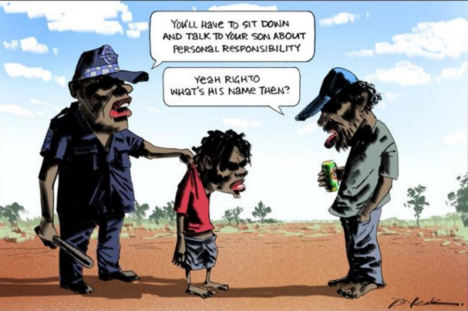Press Council declines to rule on Bill Leak cartoon complaints
The Australian Press Council has declined to rule on the controversial Bill Leak cartoon which appeared to suggest Indigenous fathers do not know the names of their own children, despite receiving more than 700 complaints about the illustration.
The illustration – which was published last month in News Corp’s national broadsheet The Australian – drew condemnation with audiences who described it as racist.
Cartoonist Bill Leak defended the cartoon, drawing a cartoon portraying himself as the victim of “tantrum throwing” and “sanctimonious Tweety Birds”.



This is a disgrace. The Press Council are supporting cultural stereotypes to oppress great Aborigines and communities who are trying to build new lives.
Oppression and stereo typing is not helping our nation to move ahead.
Bill Leak hit the nail on the head. Despite promises by successive governments the indigenous problem still exists, which is regrettable. Obviously, for some readers, the truth hurts.
Thanks Howard, for confirming that Australia is full or racists.
To me it is a tricky one and reflects both on our treatment of the first nation and on the father’s in general. Unfortunately this same cartoon could be true replicated with an absent housing commission dad or work obsessed corporate high flyer dad who out-sources his parenting to boarding schools.
It would be tricky if we hadn’t completely failed the Aboriginal population. If we had genuinely tried to fix the mess we have created. This means our politicians spending time living in Aboriginal communities, listening to their leaders and implementing their recommendations. If Aboriginal communities didn’t have lower life expectancy, lower education, higher incarceration and higher suicide rates. Yeh then it might be tricky but as it stands it just deeply offensive.
Howard Bull: you and Leak make the same error. The issue of the day was the treatment of children in a prison. Leak chose to comment on the condition of families, specifically Aboriginal families. He then chose to defend it by asserting its “truth”. As if it’s some sort of cover up that explains the situation.
As a number of Aboriginal people have said, there is no secret or denial about the problems of families in these communities. It’s an entrenched issue that has been prominent and publicly highlighted by community leaders for at least two decades.
What Leak did was to effectively blame the jailed children or their families and by omission excuse the treatment of those kids.